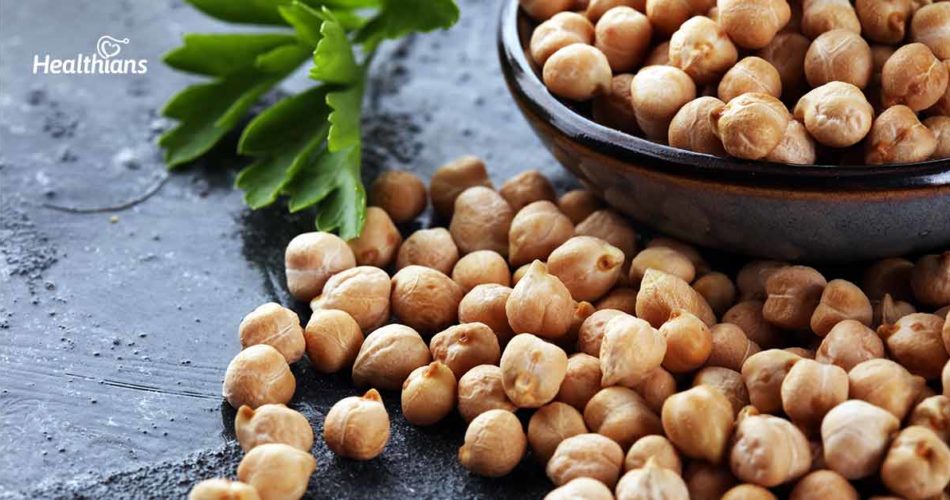Contributed by: Healthians Team
Introduction
Want a double dose of protein, but you’re a vegetarian?
The answer: Chickpeas.
Want to boost the nutritious value of your dinner salad right away?
The answer: Chickpeas.
Want to make a quick and easy afternoon snack?
The answer: Chickpeas
What are Chickpeas?
Chickpeas, also known as chana, are one of the most amazing legumes you can eat on a vegan diet. Chickpeas are commonly found in two varieties: ‘desi’ and ‘kabuli.’ ‘Desi chana’ is distinguished by its small size, black appearance and rough coat.
On the other hand, “Kabuli chana” is usually larger, lighter in colour, and has a smooth coat. There is also a chickpea variety called ‘kala chana’ available in the market.
As a healthy breakfast dish, chickpeas can be soaked overnight and lightly cooked in the morning. Chickpeas are also ground into flour, used in curries, and make a delicious salad ingredient.
Let’s dig deeper into the health benefits of this popular legume and the most nutritious ways to make it a part of your diet.
8 Health Benefits of Chickpeas
Chickpeas are one of nature’s wonder foods. This versatile legume is replete with nutrients such as B6 and C vitamins, folate, manganese, and magnesium. They are high in protein, so they are a brilliant substitute for meat.
They are also packed with calcium and potassium at little levels (crucial for heart health). And if that wasn’t enough! Chickpeas are also a great source of antioxidants, manganese, phosphorous, and zinc.
- Chickpeas aid with blood sugar regulation
Chickpeas, both canned and dry, have a low glycemic (GI) index. This necessarily means that your body absorbs and digests them at a slow pace. They also include amylose, a starch that takes a long time to digest.
Both of these prevent your blood sugar as well as the insulin levels from elevating too quickly. This is beneficial for diabetics.
- They assist digestion
Chickpeas are a great source of soluble and dietary fibre, particularly raffinose, a soluble fibre that is very important for maintaining a healthy digestive system.
This is broken down by the healthy bacteria in your gut, allowing your colon to absorb it slowly. Eating more chickpeas has been shown in studies to make bowel movements smoother and more regular.
- They aid in the reduction of cholesterol
Given the fact that chickpeas do not contain any cholesterol, you can consume them knowing that they are good for your heart health. They can lower both your total and LDL (“bad”) cholesterol levels, thereby reducing your chances of developing cardiovascular disease.
- They make your bones stronger
Loaded with calcium, magnesium, fibre, manganese, phosphate, potassium, zinc, vitamin K, and other minerals, chickpeas contribute to strong bones. When it comes to keeping a lean body mass, they are necessary for maintaining healthy bone and brain health, as well as overall strength.
As a result, including them in your regular diet is a great approach to prevent osteoporosis. But make sure to soak them first to remove phytates, which might prevent your body from absorbing the calcium in chickpeas.
- They have the potential to improve your mental wellness
Choline is a vitamin found in chickpeas. This nutrient is not only the key to feeling happy, but also aids in the production of key molecules for memory, mood, muscular control, and other brain and nervous system functions.
Additionally, chickpeas are extremely high in selenium, a powerful antioxidant that has been proven to increase cognitive function and promote good memory.
- They keep your body weight in check
The dietary fibre in chickpeas and their low glycemic index (GI) may also assist with weight loss by increasing satiety levels for a long time, thereby leading to less snacking and contributing to healthy weight management.
Scientists note that people who eat chickpeas are more likely to eat a well-balanced diet than those who do not.
- They are great for pregnant moms
Chickpeas are high in folate, fibre, protein, iron, and calcium – nutrients that are all the more essential during pregnancy.
Folate is indispensable for the health of the mother and the fetus and its shortage during pregnancy could put the baby at risk for infections and illnesses later in life.
- They have the potential to reduce cancer risk
When you consume chickpeas, your body produces a short-chain fatty acid known as butyrate. Butyrate has been shown in tests to aid in detoxifying some cancer-causing compounds in the body.
This may reduce your chances of developing colorectal cancer. Lycopene and saponins are the other vitamins in chickpeas that have also been studied for their role in protecting against other kinds of cancer.
Final thoughts
Given all of these incredible health benefits, it’s apparent that these nutrient-dense pulses are beneficial to everyone, especially for vegan and vegetarian diets.
They are gluten-free, heart-healthy, calorie-controlled and the number one health choice of 2021 and well into the future. So go ahead and make chickpeas a part of your daily diet and stay fit for life.
Besides, adding Chickpeas to your diet, you must also opt for preventive diagnostic tests to identify complications (if any) and take measures to protect your overall well-being.
Book The Full Body Health Checkup Today!




